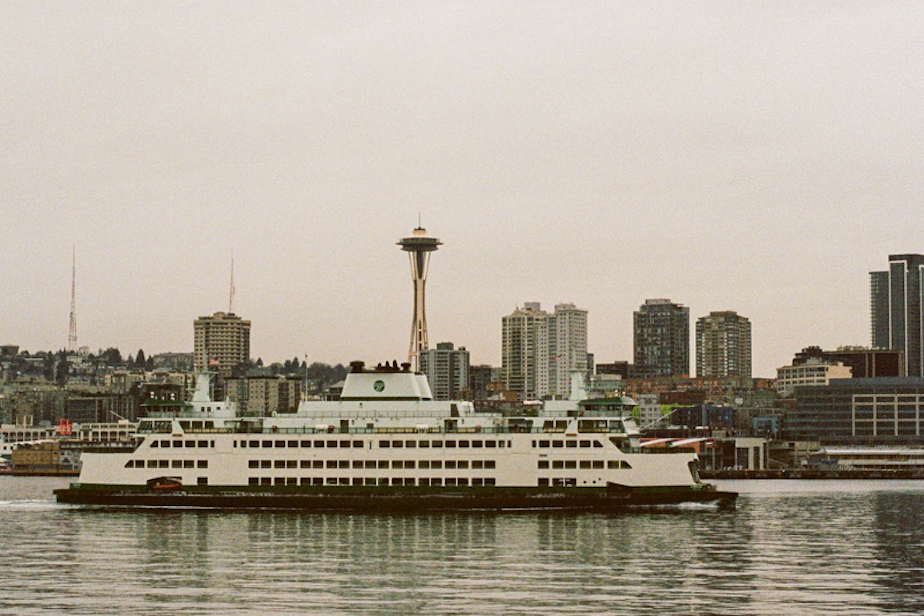Washington's ferry system has a trust problem

Officially, the Washington State Ferries had a 99% reliability rating in January 2024. But in waterfront communities hurt by too few boats and ferry-run cancellations, people remain skeptical.
During the legislative session, elected leaders are working to address their concerns.
C
heryl Lubbert brews pear cider at Nashi Orchards on Vashon Island. She says many workers in her community live off-island, because there’s very little affordable housing on Vashon. When a ferry run was cancelled recently, her production guy couldn’t get home.
“So guess where he had to sleep?" she asked rhetorically. "Our house.”
Then there’s the people who deliver her glass bottles.
“The ferries are so difficult sometimes that people won't even deliver here,” Lubbert said.
Down the road, Erin Kieper says the ferry system has a long way to go to win back public trust. She describes what happened on the day of a big summer bike ride on Vashon called "Passport to Pain."
“And the first, I think, four ferries coming from Tacoma were canceled," Kieper said. "And it's bringing 10,000 people or something over to the island to ride in this benefit bike ride that starts early in the morning.”
The loss of those visitors meant lost revenue for Kieper’s outdoor fitness company, Vashon Adventures. It meant she was less able to absorb rising insurance costs for electric bike rentals. So, she's now winding down that part of her business.
Quantifying the damage is difficult
U
p and down Puget Sound, from Bremerton to the San Juan Islands, anecdotes like these tell the story of the economic cost that comes when ferry routes are cancelled or significantly delayed. It doesn't help that several routes are short a boat, and won't get their new replacement until 2028 at the earliest.
"In the first fiscal quarter of 2024, we already have 1,069 cancelled sailings," State Rep. Greg Nance (D–Bainbridge Island) told the transportation committee at a hearing on Feb. 14. "Every one of those cancelled sailings are folks missing work, folks missing school, folks missing medical appointments."
Quantifying the damage to those communities has proven difficult. Nance has proposed a bill aimed at clarifying the scale of the problem and the cost of various short-term fixes. He got the idea while visiting the White House.
“While I was sharing more about our ferries and how we need federal help, I heard from the Biden administration that we need to bring data, we need to bring documentation, and we need to bring designs to the table," Nance said. "And I'm realizing as I went back to try to do my homework, we don't yet have that.”
RELATED: Washington State Ferries confirms passenger fears: Service disruptions will continue for years
Nance says the federal government has a strong an interest in ferries because there are six naval bases on Puget Sound. He says if the bill passes, the task force's recommendations would be ready for lawmakers before 2025's legislative session begins.
Funding Washington's ferries
C
harles Prestrud with the Washington Policy Center said Nance's bill "seems to focus primarily on finding new revenue sources. That's only half the picture. The bigger challenges are on the cost side of the equation," such as rising labor costs.
Increased pay is one tool the ferry system has to recruit and retain workers, many of whom left during the pandemic. When a crew member calls in sick, sailings get cancelled if no replacements can be found nearby.
Gov. Jay Inslee has requested more money for additional crew on each boat, along with funding for several other efforts to ease strain on the ferry system. He's said it's time to look at fast passenger-only ferries in the San Juan Islands, for example.
How the Legislature responds to those requests will become clearer after the state House and Senate unveil their proposed transportation budgets, expected during the week of February 19.
Republicans say the root of the ferry system's problem lies with the governor's quest to build electric and hybrid boats. They put together a bill that would have scuttled or delayed that electrification project, in favor of building new diesel boats from existing plans. That bill appears to have died in committee, though fiscal bills can be revived.
Inslee said on February 15 that diesel boats wouldn't speed up the process. It costs almost half a million dollars to fill the gas tank on the largest ferries in the fleet.
RELATED: WA's ferry network is stretched thin, how will it recover?
The coming electric boats are expected to run on electric battery power 95% of the time, ferry spokesperson Suane Pelley said. When on battery power, she says they'll consume only five gallons of diesel on average per crossing to run the boat's heating system.
Hear more about ferries on KUOW's economy podcast, Booming.

